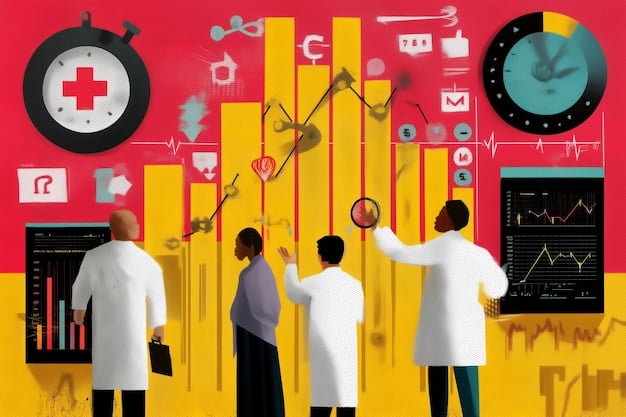AI Revolution: Streamlining US Healthcare by 2025

US healthcare is poised for a significant efficiency boost by 2025 through the integration of artificial intelligence, primarily targeting the streamlining of administrative tasks, reducing costs, and improving patient outcomes.
The American healthcare system, often criticized for its complexity and high costs, is on the cusp of a technological revolution. By 2025, artificial intelligence (AI) is projected to play a pivotal role in transforming US Healthcare Efficiency: Streamlining Administrative Tasks with AI by 2025. This shift promises not only to reduce the burden of administrative processes but also to unlock new possibilities for patient care and resource management.
The Current State of US Healthcare Administration
Before diving into the transformative potential of AI, it’s crucial to understand the current landscape of US healthcare administration. The system is notoriously complex, involving a multitude of stakeholders, intricate billing processes, and vast amounts of paperwork.
Challenges in Healthcare Administration
The challenges are multifaceted, ranging from inefficient data management to the high costs associated with manual administrative tasks. These inefficiencies not only drain resources but also impact patient care, leading to delays and potential errors.
One of the most pressing issues is the fragmented nature of healthcare data. Information is often siloed across different departments and institutions, making it difficult to obtain a comprehensive view of a patient’s medical history. This lack of interoperability hinders coordination and can lead to suboptimal treatment decisions.

The High Cost of Inefficiency
The financial implications of these administrative inefficiencies are substantial. Studies have shown that a significant portion of healthcare spending is attributed to administrative overhead, diverting resources from direct patient care. This burden is felt not only by healthcare providers but also by patients, who ultimately bear the cost through higher premiums and out-of-pocket expenses.
- Manual data entry and processing contribute to errors and delays.
- Lack of standardization across different healthcare systems creates confusion and redundancy.
- Complex billing and coding processes lead to disputes and denials.
Addressing these challenges is not merely a matter of streamlining processes; it’s about fundamentally reshaping the way healthcare is delivered. AI offers a powerful set of tools to tackle these issues head-on, paving the way for a more efficient, cost-effective, and patient-centered healthcare system.
In conclusion, the current state of US healthcare administration is characterized by complexity, fragmentation, and high costs. These inefficiencies not only strain resources but also impact patient care, highlighting the urgent need for innovative solutions like AI.
AI’s Role in Automating Administrative Tasks
AI’s potential to revolutionize healthcare administration lies in its ability to automate repetitive, time-consuming tasks. By taking over these mundane processes, AI can free up healthcare professionals to focus on what they do best: providing quality patient care.
Automating Claims Processing
One of the most promising applications of AI is in automating claims processing. Traditional claims processing is a labor-intensive process that involves manually reviewing medical records, verifying billing codes, and adjudicating claims. AI can streamline this process by automatically extracting relevant information, identifying errors, and processing claims with greater speed and accuracy.
AI-Powered Data Entry
Another area where AI can make a significant impact is in data entry. Healthcare providers spend countless hours manually entering patient data into electronic health records (EHRs). AI-powered data entry systems can automate this process by using natural language processing (NLP) to extract information from unstructured sources, such as handwritten notes and scanned documents. This not only saves time but also reduces the risk of errors.

- AI algorithms can identify and flag fraudulent claims, saving healthcare insurers millions of dollars.
- Automated data entry reduces the administrative burden on healthcare providers, allowing them to focus on patient care.
- AI-powered chatbots can answer patient inquiries and provide assistance with billing and insurance matters.
By automating these and other administrative tasks, AI can significantly reduce the operational costs of healthcare providers and insurers. This, in turn, can lead to lower premiums for patients and improved access to care.
In short, AI is poised to transform healthcare administration by automating repetitive tasks, reducing errors, and freeing up healthcare professionals to focus on patient care. This shift promises to create a more efficient, cost-effective, and patient-centered healthcare system.
Improving Data Management with AI
Effective data management is critical for delivering high-quality healthcare. AI can play a vital role in improving data management by streamlining data collection, integration, and analysis.
Centralizing Patient Information
One of the key challenges in healthcare is the fragmentation of patient data. AI can help to address this issue by creating a centralized repository of patient information. This repository can be populated with data from a variety of sources, including EHRs, claims databases, and wearable devices.
AI Analytics
Once the data is centralized, AI can be used to analyze it and identify patterns and insights that would be difficult to detect using traditional methods. For example, AI algorithms can be used to predict which patients are at high risk of developing certain conditions, allowing healthcare providers to intervene early and prevent serious complications.
AI-powered data management systems can also be used to improve the efficiency of clinical trials. By analyzing patient data, AI can help to identify potential participants, track their progress, and assess the effectiveness of new treatments.
- AI algorithms can identify trends and patterns in patient data that can inform clinical decision-making.
- AI-powered data management systems can improve the accuracy and completeness of medical records.
- Centralized data repositories can facilitate collaboration and data sharing among healthcare providers.
By improving data management, AI can help to create a more coordinated, evidence-based, and patient-centered healthcare system. This promises to lead to better outcomes, lower costs, and greater patient satisfaction.
Overall, AI is a powerful tool for improving data management in healthcare. By centralizing patient information, automating data analysis, and facilitating collaboration, AI can help to create a more efficient, effective, and patient-centered healthcare system.
Enhancing Patient Experience Through AI
Beyond streamlining administrative tasks, AI has the potential to significantly enhance the patient experience. By personalizing care, improving communication, and providing convenient access to information, AI can help to create a more patient-centered healthcare system.
Personalized Treatment Plans
One of the most promising applications of AI is in personalizing treatment plans. AI algorithms can analyze patient data to identify individual risk factors, predict treatment outcomes, and tailor therapies to meet specific needs. This approach promises to be more effective than traditional “one-size-fits-all” approaches to treatment.
AI-Powered Chatbots
AI-powered chatbots can provide patients with 24/7 access to information and support. These chatbots can answer questions, schedule appointments, and provide reminders, reducing the burden on healthcare staff and improving patient satisfaction.
AI can also be used to improve patient adherence to treatment plans. AI-powered apps can provide reminders to take medication, track progress towards goals, and offer encouragement and support. This can help patients stay on track and achieve better outcomes.
- AI algorithms can analyze patient data to identify individual preferences and tailor communication accordingly.
- AI-powered virtual assistants can provide patients with emotional support and guidance.
- Personalized treatment plans can lead to better outcomes and greater patient satisfaction.
By enhancing the patient experience, AI can help to create a more engaged, empowered, and satisfied patient population. This promises to lead to better health outcomes and a more sustainable healthcare system.
In conclusion, AI has the potential to significantly enhance the patient experience by personalizing care, improving communication, and providing convenient access to information. This shift promises to create a more patient-centered healthcare system.
Challenges and Considerations for AI Implementation
While the potential benefits of AI in healthcare are significant, there are also a number of challenges and considerations that must be addressed to ensure successful implementation.
Data Privacy
One of the most pressing concerns is data privacy. Healthcare data is highly sensitive, and it is essential to ensure that it is protected from unauthorized access and misuse. AI systems must be designed with robust security measures to prevent data breaches and comply with privacy regulations such as HIPAA.
Algorithmic Bias
Another important consideration is algorithmic bias. AI algorithms are trained on data, and if that data is biased, the algorithms will also be biased. This can lead to disparities in care, with certain groups of patients receiving less effective or even harmful treatment.
In addition to these technical challenges, there are also ethical and social considerations that must be addressed. For example, it is important to ensure that AI systems are used to augment, not replace, human healthcare professionals. It is also important to ensure that patients understand how AI is being used in their care and that they have the opportunity to opt out if they choose.
- Healthcare providers and insurers must invest in training and education to ensure that their staff are able to use AI systems effectively.
- AI systems must be transparent and explainable so that healthcare professionals and patients can understand how they work.
- There must be clear lines of accountability for the decisions made by AI systems.
By addressing these challenges and considerations, we can ensure that AI is used in a responsible and ethical manner to improve healthcare for all.
In summary, while AI offers tremendous potential to transform healthcare, it is essential to be aware of the challenges and considerations involved in its implementation. By addressing these issues proactively, we can ensure that AI is used in a way that benefits patients, healthcare providers, and society as a whole.
The Future of AI in US Healthcare by 2025
Looking ahead to 2025, the future of AI in US healthcare appears bright. As AI technology continues to evolve, we can expect to see even more innovative applications emerge, further transforming the way healthcare is delivered.
Expanded AI Integration
One key trend to watch is the continued integration of AI into EHRs. This will allow healthcare professionals to access AI-powered insights and recommendations directly within their existing workflows, making it easier to use AI to inform clinical decision-making.
Remote Patient Monitoring
Another trend to watch is the increasing use of AI for remote patient monitoring. AI-powered devices can track patients’ vital signs and other health data from the comfort of their own homes, allowing healthcare providers to identify potential problems early and intervene before they become serious.
We can also expect to see more AI-powered tools for drug discovery and development. AI can be used to analyze vast datasets of genetic and clinical information to identify potential drug targets and predict the effectiveness of new therapies. This promises to accelerate the pace of drug development and bring new treatments to market faster.
- AI will play an increasingly important role in public health, helping to track and predict outbreaks of disease.
- Healthcare providers and insurers will use AI to personalize their outreach and engagement efforts.
- Patients will have greater access to AI-powered tools and resources to manage their own health.
By embracing these trends and investing in AI research and development, we can unlock the full potential of AI to transform US healthcare and create a more efficient, effective, and patient-centered system.
In conclusion, the future of AI in US healthcare is full of promise. As AI technology continues to advance, we can expect to see even more innovative applications emerge, further improving patient care and outcomes.
| Key Point | Brief Description |
|---|---|
| 🤖 AI Automation | Reduces administrative tasks, freeing up staff for patient care. |
| 📊 Data Management | Improves data collection and analysis for better insights. |
| ❤️ Patient Experience | Enhances care through personalization and better communication. |
| 🛡️ Privacy Concerns | Addressing data privacy and algorithmic bias is crucial for responsible AI implementation. |
FAQs
▼
AI can automate tasks like claims processing, data entry, and appointment scheduling, reducing errors and freeing up healthcare staff. It optimizes workflows for better efficiency.
▼
AI enhances data management through data centralization, improved analytics, and more precise record-keeping. This improves the quality of care that can be provided.
▼
AI personalizes treatment plans, provides 24/7 support via chatbots, and enhances patient communication, making healthcare more accessible and tailored to individual needs.
▼
Challenges include ensuring data privacy, addressing algorithmic bias, and training staff to effectively use AI systems. These must be managed proactively.
▼
By 2025, expect greater integration of AI in EHRs, increased remote patient monitoring, and more AI-driven drug discovery, enhancing US healthcare efficiency and patient outcomes.
Conclusion
As we approach 2025, the integration of AI into US healthcare promises a transformative shift towards greater efficiency and improved patient care. By streamlining administrative tasks, enhancing data management, and personalizing treatment, AI is set to revolutionize the healthcare landscape. While challenges such as data privacy and algorithmic bias must be addressed, the potential benefits of AI in creating a more efficient, accessible, and patient-centered healthcare system are undeniable.





